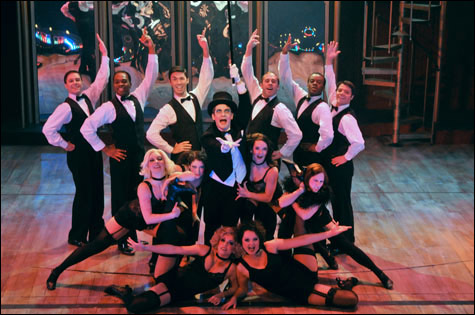
CABARET: John Kuntz and the Kit Kat ensemble need more depravity and desperation. |
The New Century, a quartet of related short plays by Paul Rudnick, takes its name from the discount department store Century 21, the Lower Manhattan incarnation of which the playwright perceived still shining in the smoke and grit generated by the 2001 fall of its neighbor the World Trade Center. There is something cut-rate, too, about Rudnick's attempt to marry flamboyant gay cliché to hope for a post-9/11 world in this new theater piece, which debuted at Lincoln Center last spring and is now in its area premiere from SpeakEasy Stage Company (at the Calderwood Pavilion through February 14). That does not change the fact that, as a purveyor of one-liners, Rudnick is more Neiman Marcus than Century 21. And before it starts straining toward a saccharine profundity in its final, title vignette, The New Century fields what amounts to a trio of comic monologues featuring likable eccentrics — all of whom have been grazed by if not immersed in gay culture — that will leave you feeling like the happy victim of an assault by Jackie Mason, Dame Edna, and Oscar Wilde.
And that triumvirate has nothing on Rudnick's three bearers-up: Helene Nadler, self-proclaimed most tolerant mother of all time; flaming Mr. Charles, cast from Manhattan into the wilderness of Palm Beach for being "too gay"; and Decatur housewife Barbara Ellen Diggs, a dedicated craftsperson drowning her maternal sorrows in bric-a-brac and cake decoration. In what is not quite a play, these survivors address us from various public forums: for Helene a meeting of the Massapequa chapter of Parents of Lesbians, Gays, Bisexuals, the Transgendered, the Questioning, the Curious, the Creatively Concerned, and Others; for Mr. Charles the middle-of-the-night cable-access TV show whose spotlight he shares with a beefcake companion named Shane; and for Barbara Ellen, who's surrounded by her cockamamie creations, the Junior Chamber of Commerce she is turning on to "the critical importance of crafts in our culture." How these three wind up warming the cockles of one another's hearts in the maternity ward of a Manhattan hospital in the final vignette would strain both lumbago and credibility to chart.

Paula Plum brings her acerb warmth and ace timing to liberal Long Island Jewish matron Helene, resplendent in winter-white pants suit and highlighted hair extensions. If all of American life is a competition, Helene is confident of winning hers: a race for the gold in maternal acceptance and support. The mother of a lesbian, a transsexual, and a leather fetishist pushing the erotic borders of excrement, she wavers between complaint and braggadocio, and most of what comes out of her perfectly painted mouth is hilarious. (Of TV's Will and Grace she opines, "It was like if Pottery Barn sold people.")
Rudnick does not rise again to the heights of Helene, though as high-camping Mr. Charles, Robert Saoud — in polyester, fuchsia, and a whipped-cream hairpiece — pulls off a bravura 60-second history of American gay theater that speed-skates from Tennessee Williams and A Chorus Line to Torch Song Trilogy, Tony Kushner, and "gratuitous frontal male nudity." At least Rudnick makes a fervent point with Mr. Charles: the playwright is angry that the assimilation of gay identity into mainstream American culture has rendered the Quentin Crisps of the world an embarrassment to some of their gay brethren. Barbara Ellen Diggs, frumpily yet beatifically embodied by Kerry A. Dowling, springs less from Rudnick's conviction than from the women's magazines of his childhood. The Midwestern mother of a gay son who died of AIDS, this Hannah Pitt of the yarn world is supposed to have overcome personal tragedy by creative endeavor. But whether we're laughing with or at her is a stickling question.
Paul Daigneault helms the slickly amusing production, which unfolds on set designer Cristina Todesco's variously accessorized red-tile circle. Rudnick does manage, albeit implausibly, to bring his three characters together for a sort of celebratory party kicked off by shopping-bag-toting Shane's discovery of the redemptive powers of reduced-price retail. And Bud Weber is charming as this hot-bodied hustler with an inkling of grace. But the message slung toward the bassinets in the final quarter of The New Century is little more than carpe diem — hardly the Sermon on the Mount. Then again, Jesus saved — just not on Ralph Lauren.
New Repertory Theatre's Cabaret (at the Arsenal Center for the Arts through February 1) is a good show — spirited and professional. But that's what it feels like: a show, in which all of the dinginess, decadence, and menace built into the award-winning 1966 Broadway musical based on Christopher Isherwood's Berlin Stories is being exhibited rather than experienced. Yes, I know it's not really 1930 in a Weimar Berlin toppling toward the Nazis at the Arsenal Center for the Arts, where outgoing artistic director Rick Lombardo's well-sung but insufficiently chilling production unfolds, its fresh-faced Kit Kat girls striking eager-beaver sex poses as a newsreel-projection Hitler rants upon the neatly planked stage floor. But Cabaret needs an air of threat, depravity, and escalating desperation to go along with its showmanship. And the New Rep production — though it borrows a few tough ideas from the Sam Mendes–directed 1998 revival that ran at Studio 54 for six years — smacks too much of Busby Berkeley and not enough of Brecht.